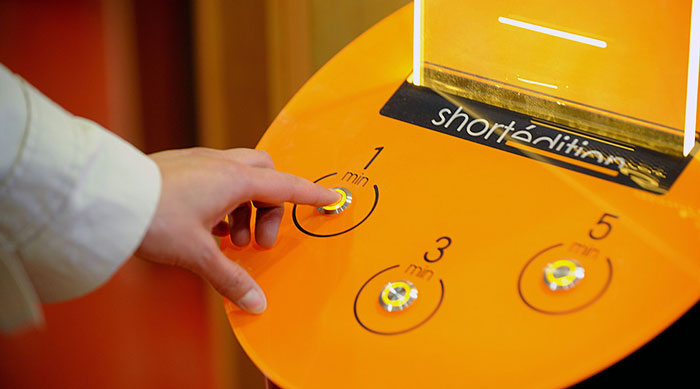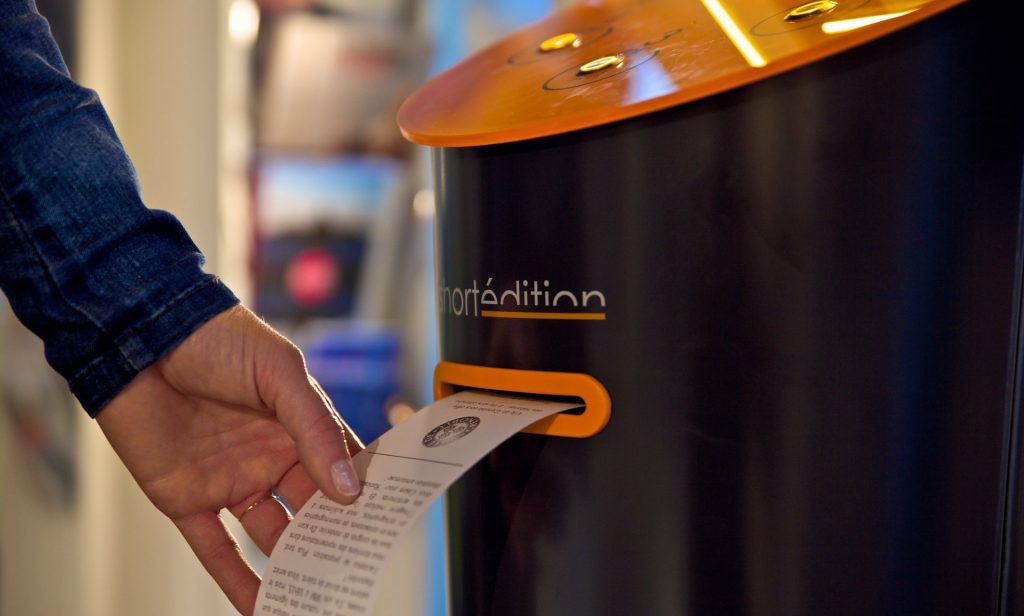“A short story is the ultimate close-up magic trick — a couple of thousand words to take you around the universe or break your heart.” – Neil Gaiman.
Short stories are like diamonds in the rough. They are the training grounds of great writers, who learn to master theme, character and style within a few thousand words before developing larger and more complex works.
Unfortunately, it’s becoming increasingly difficult for short story writers to get their product into the hands of readers. Magazines have always been the primary supporters of the medium, but even those that aren’t industry specific – The New Yorker, for instance – have seen substantial drops in circulation. The time for innovation has come.
Meet distributeur d’histoires courtes – the short story distributor.
Orange and black with a simple glass panel, the machine looks like some kind of information booth or ticket dispenser, with three buttons lining its surface that read ‘one’, ‘three’, and ‘five’. These numbers refer to how many minutes the short story – produced on a scroll of papyrus similar to a shopping receipt – will take to read.
Even better, the stories themselves (of which there are 600 already available in the machines) are completely free!
Eight systems are currently in operation in the French town of Grenoble, and are the designs of startup publishers Short Edition, whose writers are the ones that come up with the distributed stories. The idea struck one afternoon in 2013, when the team were taking a break to get a snack. One of them approached the vending machine, and idly stated that they felt the machines should offer short stories in lieu of treats. A prototype was developed the following year.
“The written word isn’t dead,” announced Christophe Sibieude, co-founder of Short Édition. “Smartphones have blurred the limits between our professional life and our distractions.The paper format provides a break from omnipresent screens. People may not have reacted so strongly to our vending machines six years ago, when smartphones hadn’t become essential to all parts of our lives yet.”
Indeed, there has been a strong reaction, with people apparently visiting the Grenoble tourism office up to twice a week just to print stories until the paper runs out. Most notably, Oscar-winning director Francis Ford Coppola was so struck by the device that he ordered one for his Cafe Zoetrope in San Francisco. It was the first distributor made available outside of France. Requests for a machine have since arrived from everywhere from Australia to Tunisia. “Imagine a distributor in every Starbucks,” Sibieude marvels.
Beyond the obvious appeal for readers lies the hope that the machine will inspire authors in a nation full of them. A 2013 poll indicated that 17% of the population had written one or more manuscripts, most of which had gone unpublished. Hopefully the short story distributors will work to motivate writers not just in France, but across the world, and offer them the platform they most desperately need to share their voice.


